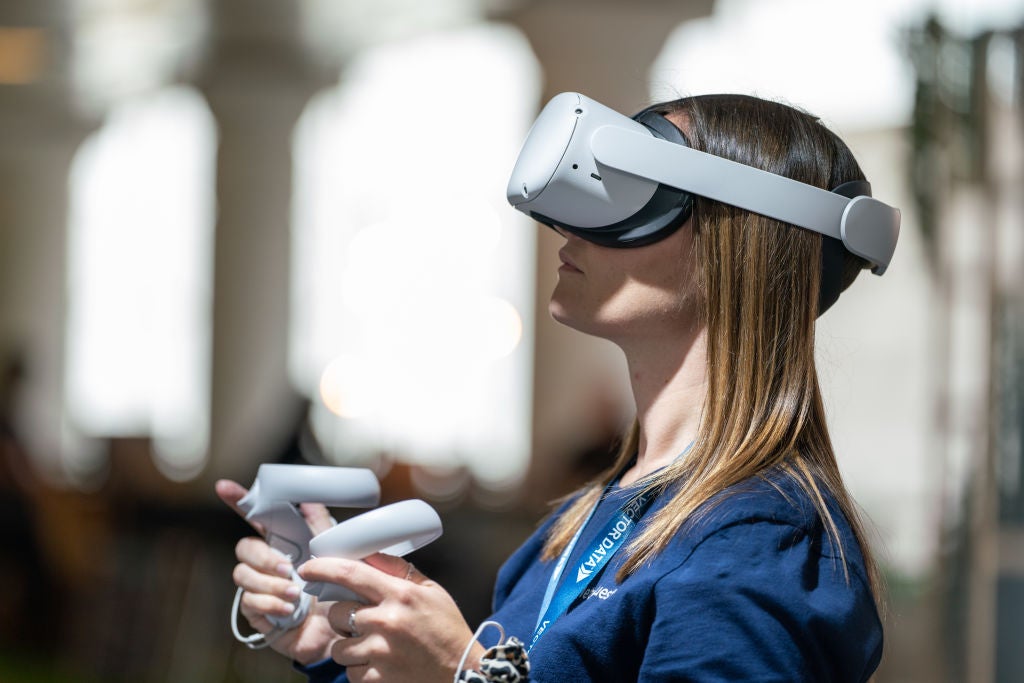
The founder of Oculus VR has taken the video game “permadeath” setting to a whole new level. The setting means that if a player dies in the game, it’s game over and that all progress made will be lost. However, Palmer Luckey has taken the concept up a notch by creating a virtual reality (VR) headset that kills the wearer if they die in a game.
Luckey, who famously sold his company to Facebook for $2bn back in 2014, based his creation on the popular Japanese novel series Sword Art Online, in which players are trapped in a huge immersive VR combat simulator.
“If you die in the game, you die in real life,” Luckey explained in his blog.
The characters in the series are killed as they are laced into something called “NerveGear,” which simulates the user’s nervous system, giving them a full immersion into the digital world, Forbes reported.
Luckey, who left Oculus in 2017 and founded defense contractor Anduril Industries, explained that his death headset is laced with charges that will explode and “destroy the brain of the user” if they die in the game.
“The good news is that we are halfway to making a true NerveGear,” he wrote about his killer feature.
“The bad news is that so far, I have only figured out the half that kills you. The perfect-VR half of the equation is still many years out.”
Luckey claims this is the only VR headset in existence that can kill the user. But as mad as it is that this thing even exists, it hasn’t actually been used by anyone – nor will it ever be. Luckey described the headset as a piece of “office art”.
The creation has certainly grabbed the attention of gamers – but those in the industry are less than impressed by the concept.
“Luckey’s ‘modified’ headset has no doubt grabbed headlines but far from the Black Mirror-esque world it is suggesting, the reality is far more pedestrian,” Max Daniels, head of gaming at communications consultancy FieldHouse Associates, told Verdict.
Daniels slammed the headset as “simply a gimmick that, while potentially in poor taste, has little bearing on the actual gaming market.”
The Luckey death headset comes as metaverse funding has soared
While Luckey’s killer headset will, hopefully, never become a common piece of equipment, it does highlight the growing importance of the metaverse. The metaverse is a virtual world where users share experiences and interact in real-time.
As that definition suggests, the use of VR headsets are often equated to the prospect of users being able to enjoy that kind of immersive experience.
Ever since Mark Zuckerberg announced that Facebook would become a metaverse company and rebranded the social media giant to Meta last year, the buzz around the metaverse has exploded.
This is particularly true if you look at funding. Metaverse companies have attracted $10.4bn in venture capital investment across 571 deals so far in 2022, according to data from research firm GlobalData. That is a significant jump compared to 2021 when metaverse companies secured 438 deals, with a combined worth of over $6.1bn.
Meta may have kicked off the whole metaverse trend, but the company has yet to profit from it. In fact, its investors have actively told The Zuck to stop throwing so much dosh on the metaverse while the company keeps delivering underwhelming quarterly results. Those results have also led to Meta announcing a new round of mass-layoffs this week.
Luckey's permadeath headset will probably not affect Meta's trajectory one way or the other, but it does make Zuckerberg's floating torsos and future vision of the metaverse feel rather tame in comparison.
GlobalData is the parent company of Verdict and its sister publications.







